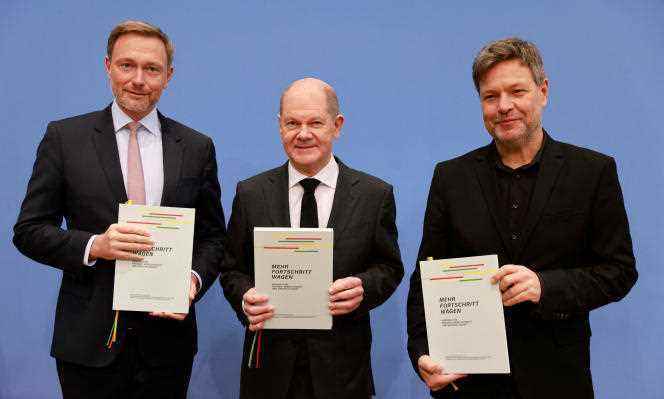When Emmanuel Macron was Minister of the Economy (2014-2016), one of his government colleagues asked him if he intended to run for the legislative elections one day. “Parliament is over. That’s not where it’s happening anymore.”, replied the future head of state. Such a remark would be unimaginable in Germany, where the post of chancellor – the real holder of executive power in a country where the president has an essentially ceremonial role – goes to the leader of the party with the largest number of deputies in the Bundestag.
Since the founding of the Federal Republic in 1949, only once has a single party won an absolute majority in the legislative elections: the Conservative Union (CDU-CSU), in 1957, with 50, 2% of votes. With this exception, the formation coming in first has always needed a partner to constitute a majority. In autumn 2021, a three-party coalition – Social Democrats (SPD), Greens and Liberals (FDP) – was formed for the first time at federal level by Olaf Scholz. A consequence of the weakening of both “popular parties” (Volksparteien) – CDU-CSU and SPD – which dominated the German political landscape for more than sixty years but which now weigh too little to settle for a single ally to govern.
Despite the unprecedented nature of the situation, the formation of this so-called “traffic light” coalition, because of the colors associated with each of its components, followed the same steps as the day after each legislative election. After “exploratory talks”which bring together the main leaders of the parties ready to work together, comes the time of the “negotiations” themselves, involving several working groups responsible for drafting a “coalition contract”. After the 2021 legislative elections, 22 thematic groups were formed, bringing together more than 300 people in total.
“Avoid the return of a strong power”
Once the coalition contract has been finalized – the current one has 144 pages – it is adopted by the different parties, generally during an extraordinary congress. An ultra-detailed roadmap of the reforms and policies planned for the duration of the legislature, the document also specifies the distribution of ministries between the various signatory parties. Noteworthy point: each party chooses the holders of the portfolios reserved for it.
In such a system, the chancellor is not a casting director, and his role as team leader is very circumscribed. “The German government is fundamentally collegial and the role of the chancellor is above all to manufacture compromise, not to impose a decisionexplains Henrik Uterwedde, researcher at the Franco-German Institute in Ludwigsburg. After the experience of Nazism, everything was done to avoid the return of a strong power. This has therefore been shared at all levels: between the federal state and the Länder; in the Bundestag, thanks to proportional representation which prevents one party from dominating the others; and finally within the government itself, with a chancellor whose success depends less on his ability to decide than on his ability to bring together different political forces. In short, the complete opposite of Ve Republic. »
You have 46.57% of this article left to read. The following is for subscribers only.
